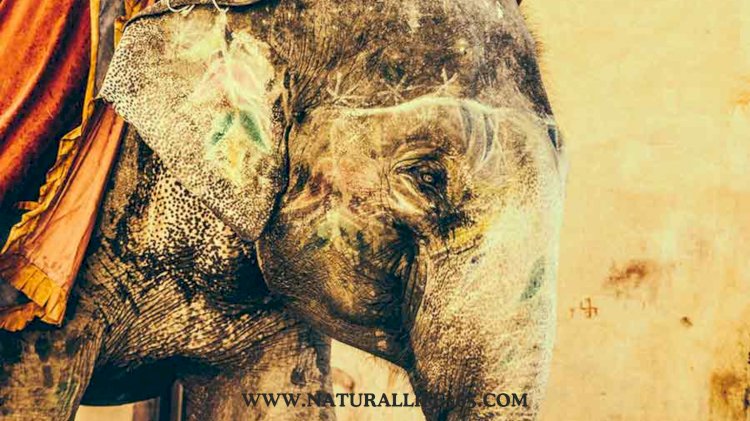Behind the Scenes of Elephant Tourism: The Dark Truth
Learn about the dark truth behind elephant rides and the urgent need for ethical, responsible alternatives. Uncover the secrets the tourism industry doesn't want you to know.

Welcome, fellow travelers and wildlife enthusiasts, to a journey that unveils the hidden side of India's popular but controversial tourist attraction: elephant tourism. On the surface, the idea of getting up close and personal with these magnificent creatures may seem like a dream come true. However, as the old saying goes, "Not everything that glitters is gold."
In this eye-opening blog, I am going to pull back the curtain on the world of elephant tourism and expose the harsh reality that often remains concealed from the well-meaning traveler. While the allure of riding, feeding, and witnessing these gentle giants up close may be enticing, there is a troubling story behind the scenes that we can no longer ignore.
My purpose here is not just to reveal the hidden realities of elephant tourism but also to learn how we can be part of a brighter, more compassionate future for these incredible beings.
Elephant Tourism: A Brief History
To truly understand the complex world of elephant tourism and its hidden shadows, we need to turn back the pages of time and delve into its history. Like many tales in the world of travel and entertainment, the story of elephant tourism is a long and intricate one, filled with both awe-inspiring moments and regrettable missteps.
Elephant tourism can trace its roots back centuries, with elephants revered and utilized in various cultures across Asia. These majestic creatures have held a special place in the hearts of people, embodying strength, wisdom, and grace. Early on, elephants were often employed for essential tasks like transportation, carrying heavy loads, and even as tools of war.
As the world evolved, so did the role of elephants. Their incredible intelligence and ability to learn and perform various tasks caught the eye of entrepreneurs seeking to capitalize on their potential. Elephant tourism began to gain momentum in the mid-20th century, and it didn't take long for it to explode into a full-fledged industry, catering to tourists' curiosity and fascination with these remarkable animals avoiding the real story behind elephant tourism.
.
In many societies, elephants have been symbols of power, spirituality, and cultural identity. In countries like Thailand, India, and Sri Lanka, these gentle giants are intertwined with religious rituals, festivals, and daily life. This cultural connection has, in part, fueled the demand for elephant tourism, as visitors seek to experience the magic and majesty that these creatures bring to local traditions.
Why You Should Avoid Elephant Ride as Tourism?
Now that we've taken a glimpse into the world of elephant tourism, it's time to address a profoundly concerning aspect that often remains concealed from the average visitor - the issue of animal cruelty and exploitative practices within the industry. Start exploring the dark side of elephant rides to understand why you should avoid elephant tourism.
Physical Abuse
Behind the scenes of many elephant tourism operations, there's a harsh reality that these gentle giants face. The training of elephants for rides and performances often involves physical abuse, including the use of sharp hooks, chains, and other tools to exert control. These methods can leave long-lasting physical and psychological scars on these intelligent, sensitive beings.
Training Methods
The traditional training methods, known as "phajaan" or "crushing," involve separating young elephants from their mothers and subjecting them to harsh conditions and violence to break their spirit. This process is not only painful but also traumatic, as it strips elephants of their natural behaviors and instincts.
Small Enclosures
For many captive elephants, their lives are confined to cramped and inadequate enclosures, often lacking the space needed for their physical and emotional well-being. These animals, which in the wild roam freely over vast territories, are subjected to a life of confinement in small, barren spaces.
Malnutrition and Health Issues
In captivity, elephants often face serious health problems due to inadequate diets and living conditions. Malnutrition is a common issue, as many lack the proper nutrition they need to thrive. The lack of space for movement also contributes to foot problems, a significant concern for elephants that spend much of their lives standing on hard surfaces.
Social Isolation
Elephants are highly social animals, forming strong bonds with their herds and families in the wild. However, captivity often separates them from their natural social structures. Isolation from other elephants can lead to stress, depression, and behavioral issues, further deteriorating their quality of life.
While not all elephant tourism establishments subject their animals to these subpar living conditions, responsible travelers must be aware of these issues and choose to support only those who prioritize the welfare of the elephants.
Legal and Regulatory Challenges
As we peel back the layers of the elephant tourism industry, it's evident that one of the significant challenges lies in the legal and regulatory framework—or often, the lack thereof—governing the treatment and welfare of these magnificent creatures.
Inconsistent Enforcement
While many countries with a history of elephant tourism have regulations in place, the enforcement of these rules can be inconsistent at best. This inconsistency leaves room for establishments to continue exploitative practices, often under the radar of authorities.
Gaps in Legislation
In some regions, the legal framework for the treatment of captive elephants is outdated and insufficient. Laws may not adequately address the evolving challenges and concerns related to elephant tourism, leaving these animals vulnerable to exploitation.
International Trade Loopholes
Another critical issue is the international trade of elephants, which can often be conducted through legal loopholes. Elephants may be bought and sold for various purposes, including tourism, with minimal oversight, making it challenging to track the movement and treatment of these animals.
Cultural and Economic Pressures
Cultural traditions and economic incentives can sometimes stand in the way of meaningful legislative changes. Elephant tourism may be deeply ingrained in a region's culture or seen as an economic necessity, making it difficult to shift the status quo.
While navigating the complex web of legal and regulatory challenges, organizations and advocates are working tirelessly to bring about change and promote the ethical treatment of elephants, one of them is the Wildlife SOS, an Indian NGO that works very hard to rescue elephants that have been used to ride tourists for many years, they also protect and conserve India’s natural heritage, forest and biodiversity.
The Impact on Elephant Populations
Beyond the immediate concerns of animal cruelty and exploitation, elephant tourism also has far-reaching consequences for wild elephant populations. As we continue our exploration, it's crucial to consider the broader impact of elephant rides on this industry and their natural habitat.
The Decline of Wild Elephant Populations
One of the most distressing consequences of elephant tourism is the negative impact on wild elephant populations. As elephants are captured from the wild to meet the demand for tourism, it disrupts the balance of ecosystems and reduces the number of elephants in their natural habitats. This contributes to the decline of wild populations, which are already vulnerable due to habitat loss and poaching.
Illicit Trade and Poaching
The demand for elephants in tourism has led to illicit trade and poaching, as organized criminal networks seek to meet this demand. The illegal capture and trafficking of elephants not only harm wild populations but also subjects captured animals to unspeakable suffering.
Threats to Conservation Efforts
Ethical and responsible conservation efforts to protect and preserve wild elephants face significant challenges in the wake of the demand for captive elephants. The diversion of resources to address the consequences of elephant tourism can hamper the crucial work being done to protect these magnificent creatures and their habitats.
Understanding the broader impact of elephant tourism on wild elephant populations is a critical aspect of addressing the dark truth of this industry.
The Rise of Ethical Elephant Tourism
While our journey through the underbelly of elephant tourism has revealed some disheartening truths, it's also essential to highlight the positive shifts taking place in the industry. Ethical alternatives to elephant tourism are emerging, offering a glimmer of hope and a brighter future for these incredible creatures.
Alternatives to Exploitative Practices
Ethical elephant tourism puts the welfare of the elephants first. This means no riding, no tricks, and no physical abuse. Instead, visitors have the opportunity to observe and interact with elephants in ways that are respectful and non-intrusive. Activities may include feeding, walking alongside them, or simply watching them go about their daily lives in a more natural environment.
Responsible Tourism Options
Responsible travel and elephant welfare can make a positive impact by choosing elephant tourism experiences that prioritize the well-being of the animals. Supporting sanctuaries and organizations that rescue and care for elephants, rather than exploit them, is a powerful way to promote ethical practices and contribute to their conservation.
Successful Case Studies
There are numerous success stories where elephants, once subjected to harsh conditions, have found refuge in ethical sanctuaries. These organizations work diligently to rehabilitate and provide a safe and nurturing environment for these animals. It's heartening to see elephants regain their physical and emotional health after years of suffering.
By supporting these ethical alternatives and spreading awareness, we can play an active role in the transformation of the elephant tourism industry.
How Can You Help?
Now that we've uncovered the dark truth behind elephant rides and explored the rise of ethical alternatives, you might be wondering how you, as a responsible traveler and animal lover, can make a positive difference. Fortunately, there are several meaningful ways to contribute to the well-being of elephants and support ethical practices.
1. Educate Yourself and Others
Knowledge is power. Educate yourself about the issues surrounding elephant tourism, and share this information with friends, family, and fellow travelers. The more people are aware of the challenges elephants face, the greater the potential for positive change.
2. Choose Ethical Elephant Tourism
When planning your travels, research and select elephant tourism experiences that prioritize the welfare of the animals. Look for sanctuaries and organizations that do not offer rides or performances and focus on providing a safe and natural environment for the elephants. Next, you will find some of them:
Wildlife SOS Elephant Conservation and Care Center
- Location: Mathura, Uttar Pradesh, India.
- Website: Wildlife SOS Elephant Conservation and Care Center
- Note: This sanctuary is dedicated to the rescue and rehabilitation of elephants from abusive situations.
Elephant Valley Project
- Location: Kodaikanal, Tamil Nadu
- Website: Elephant Valley Project
- Note: This project provides a natural habitat for retired and rescued elephants in a lush rainforest setting.
Bannerghatta Biological Park
- Location: Bannerghatta, Karnataka
- Website: Bannerghatta Biological Park
- Note: This park offers a safari experience where visitors can observe free elephants in a semi-natural environment.
The Wildlife Trust of India (WTI)
- Location: Various locations across India
- Website: Wildlife Trust of India
- Note: WTI is involved in various conservation and rescue efforts, including elephant welfare and protection.
Please note that the availability and status of these sanctuaries and organizations may change, so it's advisable to visit their websites or contact them directly for the most up-to-date information on visiting and supporting their initiatives.
3. Volunteer or Donate
Many ethical elephant sanctuaries and organizations rely on volunteers and donations to support their conservation efforts. If you have the opportunity, consider volunteering your time or contributing to these organizations financially to help care for and rehabilitate elephants.
4. Support Conservation Initiatives
Beyond ethical tourism, there are numerous conservation organizations dedicated to protecting both captive and wild elephants. Supporting these initiatives, whether through donations or advocacy, can have a significant impact on their well-being.
5. Responsible Tourist Practices
While visiting elephant sanctuaries, adhere to responsible tourist practices. Follow the rules and guidelines set by the sanctuary, respect the elephants' space, and minimize any stress or disturbances to the animals.
6. Encourage Sustainable Travel
Support sustainable and eco-friendly travel practices. Reduce your carbon footprint and choose accommodations and tour operators that prioritize eco-conscious initiatives, benefiting not only elephants but the entire ecosystem.
By taking these actions, we can collectively contribute to a more compassionate and sustainable future for elephants in the tourism industry. Remember that every choice you make can make a positive impact and help ensure these magnificent creatures are treated with the respect and care they deserve. Join me in my mission to be responsible travelers and advocates for the well-being of elephants.
And this is a personal request, please refuse to ride elephants both in India and in any other country in Asia. I am not sponsored by any of the organizations mentioned here, I am just an animal lover like you who after seeing up close some elephants chained in small places by tour agencies that sell elephant rides in Rajasthan, I have felt very bad.
I have had conversations with those people in charge of this industry, believe me, I have made them so uncomfortable (they couldn’t answer some questions) that they have kicked me out of the area where they keep those kidnapped animals. Yes, because they are elephants kidnapped from their mothers, and taken from their natural habitat. And those people are very aggressive; they just have one thing in mind: your money!
Remember that if there is no demand, there is no supply and this is a pretty dirty industry. Do not you believe me? Follow Wildlife SOS on Instagram where you'll see what I'm talking about. Don’t support the elephant tourism industry, don’t ride them.
Please, share this blog ![]()







































